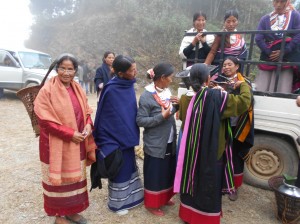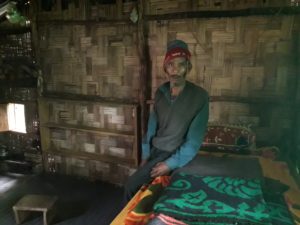Sekrezu, a small village in the Phek District of Nagaland was host to the third ever Biodiversity Festival organised by the North East Network (NEN), a women’s rights organisation working in the north east region of India with a focus on women’s human rights held on the 22nd of October. As many as 10 villages from the Phek District jointly host this festival.
NESFAS, which was also part of the second edition of the festival, was again given the opportunity to take part in this year’s biodiversity celebration. The team visiting from NESFAS included community members from Nongnah, South West Khasi Hills, Kong Melina Syiemlieh, Kitboklang Rangad and John Shangdiar, NESFAS Board Member, Carl Rangad, and NESFAS Staff, Phidarilin Uriah and Markus Rani.

This was a chance for NESFAS to help reconnect the people of Nongnah, one of the least exposed communities among its focus areas in Meghalaya, to their lands and agricultural heritage.
Melina Syiemlieh’s experience in Nagaland brought back to her, memories of the village where she grew, a once lush and biodiverse village like Sekrezu that was fed by nutrient rich soil. In contrast, the earth now resembles powdery dirt that ceases to support any type of plant ever since the arrival of the broom.
The trip reinforced the ominous actuality of the situation in her village. She deeply wishes to have again the greenery that she saw as a child and hopes to be that change agent to divert other farmers from her village from the short term overhaul of this malicious grass. Even more so because it so happened that Melina’s mother, Kong Drik was the first person to introduce broom cultivation in a tiny farm village of Myriaw. At that time, broom used to merely be grown on the outer edges of a paddy field, and sometimes not even intentionally. At that time, village farms used to cradle immense varieties of pumpkins, yams, chillies, millets, beans and turmeric. In fact, the village was pretty much well known in the South West Khasi Hills for this.
Paddy used to grow abundantly in the fields and cover the majority of the cultivated lands. By March, people would become engaged in collecting the paddy stalks to store in their barns. However, about 40 years ago, the people gradually began planting tapioca alongside the paddy. They soon learned that burning hay in the fields helped the tapioca to grow but what they didn’t realise was that it was not so for the paddy. The tapioca production gradually increased while that of the rice dropped till it came to the point where rice production came to a complete stop.
Meanwhile, Melina’s mother began collecting broom flowers growing in the neighbouring wilds to try her luck at a local market along with her other harvests. Selling broom was an unheard-of idea back then. People jeered at her for her preposterous business venture but that did very little to budge her and she continued to make her sale diligently. Soon enough two other farmers, Phi Lyngkhoi and her sister, Na took up selling broom that no one wanted to buy.
The brooms came to the market and returned with the sellers until one fateful day when a merchant from Mawsynram, walked into the village marketplace and, impressed by their quality, bought the whole lot. Word spread rapidly throughout the South West of the worthy broom from Myriaw.
Soon after, another merchant from the plains bought a large stack of the broom. This initial success of the broom thus was followed by a never ending demand for this famed brush. Seeing that the three broom gatherers had possibly come upon a possible gold mine, the other farmers plunged into farming the broom. The broom grass has, thus, ever since, draped the farms all over Myriaw. The farmers unfortunately were blind to the slow death of the biodiversity of their land and the soil that supports them while trying to make their hundred ends meet.
By the time they realised their folly, the food was gone. The broom had damaged most of soil of Myriaw as it did to so many villages elsewhere.
Melina and the two other returning from Nagaland made promises to themselves that they will, in their own little ways, attempt to rectify the horrible mistake their parents made not so long ago.



